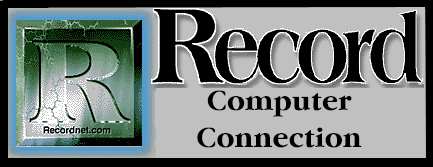
CeePrompt! Computer Connection
A few clues can teach you a lot about Web Sites
Knowing Internet shorthand gives browsers more information about where their 'facts' are coming from
4/22/96

A feature story that ran April 14th, "S. J. County election mysteries linger", concerned the airing of election results by Continental Cablevision. Normally, tabulations are faxed from the San Joaquin County Registrar of Voters to Continental. But since faxes were slow to arrive the night of March 26th, a Web site on the Internet posted results from local area races and Continental shot footage directly from the computer screen and broadcast it to viewers.
There was only one problem: The results weren't entirely accurate.
In fact, the results in District 6 were so inaccurate that a political consultant is calling for an audit of logs from the registrar's office to rule out any hacking or other foul play. To add to the mystery and intrigue, the Web site in question has vanished into cyberspace and those involved in airing the election results can't recall the exact site address.
It is puzzling and "goofy", to quote a Continental spokesperson. But it is also potentially serious and evidence of how naïve we are in the face of this new electronic medium that has garnered so much attention and adoration.
An entire industry has been turned upside down with it's frenetic Internet obsession. Even Wall Street is behaving out of character, completely enamored with Internet madness.
Let's try and remember that the World Wide Web is nothing more than a collection of documents that reside on a very large computer network for public viewing. These documents are created by people and companies that may represent themselves accurately, or not. ("Pay no attention to that man behind the curtain! I am the great and powerful Oz!")
How can you tell who's behind a Web site? Start by looking at the Uniform Resource Locator or address in the Location box of your Web browser. This usually starts with http://www... The next part of the address is the host name, or the computer (server) where the document resides. People or companies producing Web documents might own their own servers, but since this is quite expensive it's more likely that they're using or renting space from an Internet provider. These sites are referred to as virtual servers.
The three characters that follow, .edu .gov or .com, for example, refer to the site domain. For example,.edu is a Web server located at an educational institution; .gov refers to a government site and .com is a commercial site. Any information that follows, separated by slashes, refers to files and subdirectory locations on the server.
Let's translate the following URL: http://jarl.cs.uop.edu/esb/ Jarl is the name of a server on the World Wide Web (http) hosted by the Computer Science Department (cs) at the University of the Pacific (uop.edu). On that same computer are documents concerning the Eberhardt School of Business (esb). Here's another: http://www.sony.com. This commercial Web site is owned by the Sony Corp.
How about: http://www.ceeprompt.com. This, too, is a commercial Web site for my consulting business. But unlike Sony, I don't own my own Web server. Rather I borrow space on a commercial system. How would you know the difference? How might you determine where the computer hosting a particular Web site is located?
You might start by using a WHO IS query from the Internet Network Information Center (InterNIC). InterNIC maintains the directories and databases of nearly all Internet sites. This task was administered by the National Science Foundation but was privatized due to the overwhelming growth of the World Wide Web.
Contact the above Web site, and simply type the domain name portion of a Web site, ie. ceeprompt.com, and InterNIC will return names, addresses, phone numbers or references for the actual owners or locations of a particular Web server.
You also may send e-mail to postmaster@hostname.domain, or webmaster@hostname.domain requesting information about a particular site. These generic e-mail addresses are usually routed to the person who maintains documents at a particular Internet location.
Whether you're conducting business or pleasure on the Internet, use the same standards you would in any other situation: Know who you are dealing with. This will lend validity and integrity to this new frontier and may avert potential embarrassment down the road.
Return to Article Index | Return to CeePrompt's Home Page
©1996 The Stockton Record, Page Design and Layout by RRS and CeePrompt!